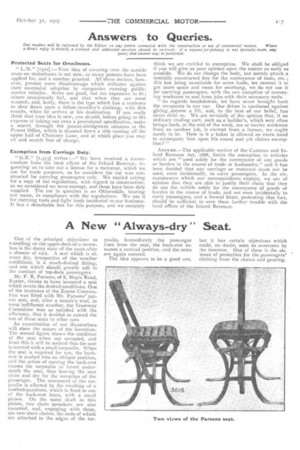Answers to Queries.
Page 23

If you've noticed an error in this article please click here to report it so we can fix it.
Our readers will be informed by the Editor on any points connected with the construction or use of commercial motors, Where
a direct reply is desired, a stamped and addressed envelope should be enclosed : if a request for Privacy is not specially made, any query and answer may be published.
Protected Seats for Omnibuses.
" L.NI." [1312] :—Your idea of covering over the outside seats on motorbuses is not new, as many patents have been applied for, and a number granted. All these devices, however, present some disadvantage which militates against their successful adoption by companies running publicservice vehicles. Some are good, but too expensive to fit; others occasionally fail, and that when they are most wanted; and, lastly, there is the type which has a tendency to shut down upon a fellow-traveller's clothing, with .dire results, when he •arrives at his destination, if you really think that your idea is new, you should, before going to the expense of taking out even a provisional specification, make a search through the patent-abridgment columns at the Patent Office, which is situated down a side turning off the upper half of Chancery Lane, and at which place you may sit and search free of charge.
Exemption from Carriage Duty.
" G.B." [1,313] writes :—" We have received a meniorandum from the local officer of the Inland Revenue, requesting us to take out a license for a motorcar, which we use for trade purposes, as he considers the car was constructed for carrying passengers only. We replied asking for a copy of the regulations, with regard to construction, as we considered we were exempt, and these have been duly supplied. The car in question is an Oldsmobile, bearing our name, in compliance with the regulations. We use it for carrying tools and light loads incidental to our business. It has a detachable box for this purpose, and we certainly think we are entitled to exemption. We shall be obliged if you will give us your opinion upon the matter as early as possible. We do not change the body, but merely attach a specially constructed box for the conveyance of tools, etc. ; this box being unsuitable for some loads, we remove it to get more space and room for overhang, we do not use it for carrying passengers, with the one exception of conveying workmen to and from jobs with their necessary tools. " As regards breakdowns, we have never brought back the occupants in our car. Our driver is cautioned against giving anyone a lift, and, to the best of our belief, has never done so. We are certainly of the opinion that, if an ordinary trading cart, such as a builder's, which very often brings hack, at the end of the week, ten or twelve workmen from an outdoor job, is exempt from a license, we ought surely to be. How is it a baker is allowed an extra hand to accompany him upon his round and yet claims exemption? "
ANswEn..—The applicable section of the Customs and Inland Revenue Act, 1888, limits the exemption to vehicles which are "used solely for the conveyance of any goods or burden in the course of trade or husbandry,". and it has been decided that any carriage or motorcar must not be used, even incidentally, to carry passengers. In the circumstances which our correspondents explain, we are of opinion that they are able to justify their claim that they do use the vehicle solely for the conveyance of goods or burden in the course of trade, and not even incidentally to carry passengers, and a formal letter, protesting that fact, should be sufficient to save them further trouble with the local officer of the Inland Revenue.
























